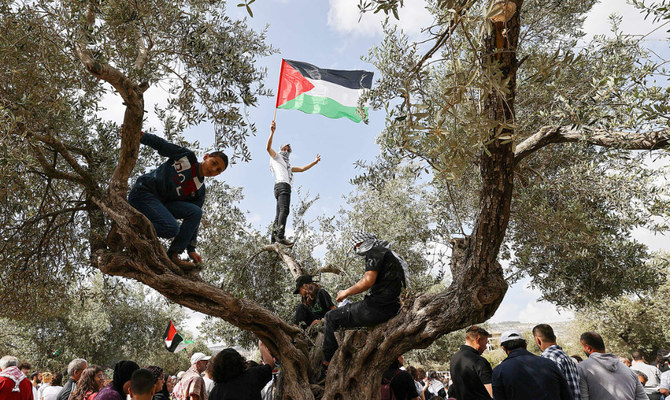GAZA CITY: In response to Palestinian attacks in Israel, Israeli threats to assassinate the leader of Hamas in Gaza have provoked sharp reactions from the military wing of the organization and other Palestinian factions.
Media outlets quoted officials as saying that Israel is planning to assassinate Yahya Sinwar, head of Hamas’ political bureau in Gaza, especially after his recent speech during Ramadan and his threats to Israel.
Israeli threats to carry out a military operation in Gaza in response to the Palestinian attacks have increased.
The Palestinian attacks began during Ramadan, the last of which was an operation that killed three Israelis in Elad, east of Tel Aviv.
Israeli Communications Minister Yoaz Hendel said that the release of Sinwar from prison during the Gilad Shalit deal was a mistake.
Knesset Member Avi Dichter of the Likud party said that Sinwar should not reach old age, in reference to his support for the possibility of his assassination.
Israeli Defense Minister Benny Gantz said: “We are looking at our steps and we will make our decisions, and we do it only in closed rooms.”
Al-Qassam Brigades Spokesman Abu Obeida responded on Saturday, warning Israel against its intention to kill Sinwar.
“The cowardly Israeli occupation’s threats of the possible assassination of Yahya Sinwar or any of the resistance leaders are an indication of an earthquake in the region and an unprecedented response,” Abu Obeida said
He added: “We will bring about a new catastrophic chapter in the Zionist regime’s history.”
Following Al-Qassam’s statement, Israeli security officials reported that their army had recommended that the country’s political leadership not assassinate the Hamas leader at the present time.
Palestinian newspaper Al-Quds also quoted unnamed sources as saying: “Israel has sent a message to the Palestinian factions through intermediaries, that it will not carry out any assassination operation and has no intention of escalation in Gaza.”
“The assassination of Sinwar has one immediate meaning: An armed confrontation,” Alex Fishman, a military analyst for Israeli newspaper Yedioth Ahronoth, said.
Since 2008, the Gaza Strip has witnessed four wars, the last of which was in May last year and lasted for 11 days.
Sinwar said in his last public speech: “We must prepare to advance, break borders, and change the bitter reality in which our nation is living…Gaza, with its people, resistance and elite, will be the real guarantor of the national project…We will not hesitate to use the sword with all our might, and we will defend our people.”
Palestinian sources told Arab News that there has been continuous contact with Egypt — almost daily since last March — to prevent any escalation in the Gaza Strip.
The sources, who declined to be named, said: “There are continuous attempts by the Egyptians to prevent escalation, and these attempts have succeeded on several occasions during the last period so far. They are passing messages between the Palestinian factions and the Israeli government with the support of the US.”
Mustafa Ibrahim, a Palestinian expert on Israeli affairs, explained that incitement in Israel is being led by a large majority of Israeli journalists.
“The talk is about the possibility of launching a military operation against Gaza, not just an assassination, which would be a political decision if it happens. I don’t think that launching a large-scale military operation in Gaza is currently feasible, but the goal is to re-assess the assassination policy, and if it happens, nobody knows where things will go,” he told Arab News.


























